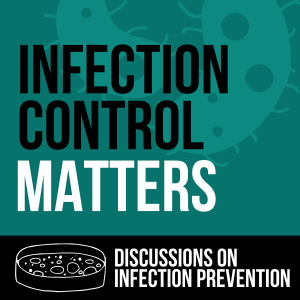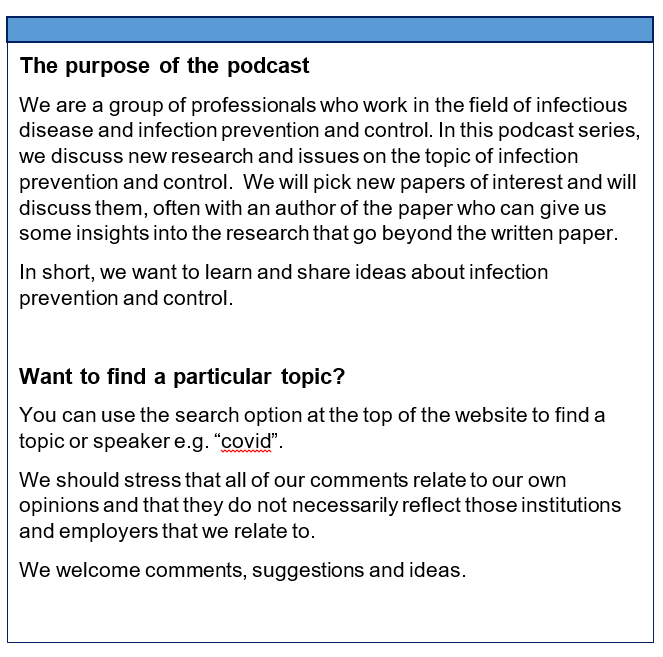Infection Control Matters
We are a group of professionals who work in the field of infectious disease and infection prevention and control. In this podcast series, we discuss new research and issues on the topic of infection prevention and control. We will pick new papers of interest and will discuss them, often with an author of the paper who can give us some insights into the research that go beyond the written paper. Authors will include nurses, doctors, academics, clinicians, administrators and leaders. We should stress that all of our comments relate to our own opinions and that they do not necessarily reflect those institutions and employers that we relate to. We welcome comment, suggestions and ideas. Please consider subscribing for updates and to find collections of topic specific podcasts at www.infectioncontrolmatters.com
Episodes

Wednesday Aug 07, 2024
Wednesday Aug 07, 2024
In this episode, Martin Kiernan catches up with Dr Gonzalo Bearman, Professor of Internal Medicine at Virginia Commonwealth University, Richmond, USA. We talk about the opportunities and dangers of using large language models like ChatGPT in the infecton prevention space. A link to a recent open access paper on this topic is here
Langford BJ, Branch-Elliman W, Nori P, Marra AR, Bearman G. Confronting the Disruption of the Infectious Diseases Workforce by Artificial Intelligence: What This Means for Us and What We Can Do About It. Open Forum Infect Dis. 2024;11:ofae053 https://www.ncbi.nlm.nih.gov/pubmed/38434616
https://www.ncbi.nlm.nih.gov/pmc/articles/PMC10906702/pdf/ofae053.pdf

Wednesday Jul 24, 2024
Wednesday Jul 24, 2024
In this episode, Martin Kiernan talks to representatives of the Multi-disciplinary Team at Leeds Teaching Hospitals NHS Trust in the UK, Dr Jessica Martin IPC Matron Adele Dyche and Haematology Matron Katie Sweeting . Building on from previously published work, they describe how efforts from the front line can impact on water safety, including initiatives such as sink removal, education programmes and collaborative working. This work won the 2023 award for Infection Prevention and Control at the annual Nursing Times Awards
The original paper from the group can be found here:
Rice W, Martin J, Hodgkin M, Carter J, Barrasa A, Sweeting K, et al. A protracted outbreak of difficult-to-treat resistant Pseudomonas aeruginosa in a haematology unit: a matched case-control study demonstrating increased risk with use of fluoroquinolone. J Hosp Infect. 2023;132:52-61. https://www.ncbi.nlm.nih.gov/pubmed/36563938

Wednesday Jul 10, 2024
Wednesday Jul 10, 2024
In this episode, Brett and Martin report on a visit to the massive Interclean Expo held biannually in Amsterdam and the Healthcare Hygiene meeting. We report on the staggering range of equipment available and the fact that IPC often has little say in this especially if there are potential risks, referring to a previous podcast https://infectioncontrolmatters.podbean.com/e/investigating-a-unique-cpeoutbreak-a-possible-new-place-to-look/
Click here for a video of one hall at Interclean (of 12).

Thursday Jun 27, 2024
Thursday Jun 27, 2024
In this episode, Martin has been on the road again and talks to two poster presenters at the IPAC-Canada 2024 conference. In the first part, Martin talks to Margaret Cameron from Peterborough Regional Health Centre, Ontario about the use of the Multiple Mini Interviewing approach to the selection of suitable candidates to become part of the hospital Environmental Service Attendant team. This innovative approach uses scenarios to test a candidate's suitability for this important role.
In the second part, Karrie Yausie from Saskatchewan health Authority talks about a blip in orthopaedic implant SSI rates that was investigated with some interesting aspects.
You can download Margaret's poster here and Karrie's here

Wednesday Jun 12, 2024
Wednesday Jun 12, 2024
This week we have a second batch of posters that we liked at ESCMID Global and will be talking about:
VRE Surveillance using hospital waste water during an outbreak
Assessing the Hawthorne effect: Implications and solutions
The impact of an early Infectious Disease consultation for CLABSI: a single centre retrospective study
Semi-continuous disinfection of sinks with UVC on a haematologydepartment for infection prevention
Urinary tract microbiome of asymptomatic individuals with spinal cord injury
Nurses known to be colonized with livestock-associated MRSA did not cause transmission to patients
Clostridium difficile contamination of australian retail vegetables and households
Prolonged use of breathing systems used in anesthesia for up to 7 days instead of 24H
A pdf of the posters can be downloaded here

Wednesday May 29, 2024
Wednesday May 29, 2024
In this episode Brett, Phil and Martin tour the posters at ESCMID Global 2024 and we discuss some of them with the authors. A link to images of the posters can be found below.
Here are the posters we discuss
AMR Surveillance in waste water and clinical isolates from a tertiary hospital: Preliminary results
Deciphering the temporal short-term dynamics of Acinetobacter baumanii: Impact of colonisation pressure in infection in an endemic Indian intensive care unit (Manasa Tantry discussion)
Post-antibiotic risk for recurrent lower respiratory tract infection during prolonged hospitalisation
Transmission of MDRO during physical and occupational therapy appointmants a 3 Veterans Affairs Hospitals
Aircraft lavatory wastewater surveillance for SARS-CoV2 and other coronaviruses by using family-wide RT-PCR, Thailand, October – November 2023
Enhancing feedback and implementation of infection risk scan findings (IRIS) among healthcare workers in nursing homes
Proper glove use: a multicentre before-after regional study (Anne F. Voor and Juliëtte Severin discussion)
Poster link to see the posters we discuss Posters from ESCMID Global - Part 1
More posters to come!

Wednesday May 15, 2024
Wednesday May 15, 2024
It was day 3 at ESCMID Global 2024 and Phil, Brett and Martin mull over the day. Amongst the items we discuss are:
What does endogenous really mean?
AI in the IPC space - friend or foe?
Fungal outbreaks - epidemiological challenges and tracing the source
Automated bloodstream infection surveillance
The Euro PPS survey results - data in action (or inaction)
Subsequent to the podcast recording the ECDC PPS results have been published and can be found here:
https://www.ecdc.europa.eu/sites/default/files/documents/healthcare-associated--infections-antimicrobial-use-point-prevalence-survey-2016-2017.pdf

Thursday May 09, 2024
Thursday May 09, 2024
In this episode, Phil, Brett and Martin dicuss more sessions from ESCMID Global (Barcelona, 2024). We talk about sessions on cleaning the occupied bed space, SSI prevention and the difficulty of designing and executing good studies in IPC. We were particularly interested in papers from Italy on the use of probiotics in IPC and some papers from Prof Cassini's group are highlighted below.
Calabro GE, Caselli E, Rognoni C, Laurenti P, Moscato U, ML DIP, et al. [Health Technology Assessment of the introduction of the Probiotic Cleaning Hygiene System (PCHS) in the Italian healthcare setting: update]. J Prev Med Hyg. 2023;64:E1-E35. https://www.ncbi.nlm.nih.gov/pubmed/37881619
D'Accolti M, Soffritti I, Bini F, Mazziga E, Cason C, Comar M, et al. Shaping the subway microbiome through probiotic-based sanitation during the COVID-19 emergency: a pre-post case-control study. Microbiome. 2023;11:64. https://www.ncbi.nlm.nih.gov/pubmed/36991513
D'Accolti M, Soffritti I, Bini F, Mazziga E, Mazzacane S, Caselli E. Pathogen Control in the Built Environment: A Probiotic-Based System as a Remedy for the Spread of Antibiotic Resistance. Microorganisms. 2022;10. https://www.ncbi.nlm.nih.gov/pubmed/35208679
Caselli E, Purificato I. Could we fight healthcare-associated infections and antimicrobial resistance with probiotic-based sanitation? Commentary. Ann Ist Super Sanita. 2020;56:263-6. https://www.ncbi.nlm.nih.gov/pubmed/32959791|
Caselli E, D'Accolti M, Vandini A, Lanzoni L, Camerada MT, Coccagna M, et al. Impact of a Probiotic-Based Cleaning Intervention on the Microbiota Ecosystem of the Hospital Surfaces: Focus on the Resistome Remodulation. PLoS One. 2016;11:e0148857. https://www.ncbi.nlm.nih.gov/pubmed/26886448

Thursday May 02, 2024
Thursday May 02, 2024
In this episode, Brett, Martin and Phil mull over the newly published WHO discussion document on respiratory particles and Martin catches up with Prof Cath Noakes from the School of Engineering in Leeds, UK to get her take on it.
You can download the document we are discussing here
https://www.who.int/publications/m/item/global-technical-consultation-report-on-proposed-terminology-for-pathogens-that-transmit-through-the-air

Tuesday Apr 30, 2024
Tuesday Apr 30, 2024
In this podcast, Brett and Martin reflect on the "Infection Control Papers of the Year" presented at ECCMID (AKA ESCMID Global) 2024.
Here are a selection of some of the papers mentioned:
Decolonization in Nursing Homes to Prevent Infection and Hospitalization https://pubmed.ncbi.nlm.nih.gov/37815935/
Reducing Hospitalizations and Multidrug-Resistant Organisms vi a Regional Decolonization in Hospitals and Nursing Homes https://pubmed.ncbi.nlm.nih.gov/38557703/
Prevention of non-ventilator-associated hospital-acquired pneumonia in Switzerland: a type 2 hybrid effectiveness-implementation trial https://pubmed.ncbi.nlm.nih.gov/36893785/
Skin Antisepsis before Surgical Fixation of Extremity Fractures https://www.nejm.org/doi/full/10.1056/NEJMoa2307679
Trial of Vancomycin and Cefazolin as Surgical Prophylaxis in Arthroplasty https://www.nejm.org/doi/full/10.1056/NEJMoa2301401
Investigation of individual nurses' relative hand hygiene performance using an anonymous automated electronic hand hygiene monitoring system and a nursing assignment schedule https://www.ajicjournal.org/article/S0196-6553(22)00468-0/abstract
Environmental cleaning to prevent hospital-acquired infections on non-intensive care units: a pragmatic, single-centre, cluster randomized controlled, crossover trial comparing soap-based, disinfection and probiotic cleaning https://pubmed.ncbi.nlm.nih.gov/37089619/

About us and contact
Feel free to contact us with suggestions on topics and or speakers. Use Twitter to contact any one or all of us:
Brett Mitchell @1healthau (Twitter link)
Martin Keirnan @emrsa15 (Twitter link)
Deb Friedman @friedmanndeb
Phil Russo: @PLR_aus (Twitter link)

Martin Kiernan: Martin is a highly experienced nurse who has worked in the field of infection prevention and control since 1990 in the acute hospital community and, more recently, in academic and industry settings with GAMA Healthcare. Martin's reputation as a research collaborator is recognised both nationally and internationally. Martin’s involvement in professional organisations such as the Infection Prevention Society and the Healthcare Infection Society has enhanced his reputation as a key opinion leader, teacher, leader, and researcher. As a result, he has been invited to act in leadership and mentoring roles to support his colleagues throughout the world in terms of infection prevention.

Professor Brett Mitchell: Brett is a Professor of Nursing with over 150 peer reviewed journal and oral conference presentations, authored several books, and has been an invited speaker at numerous infection prevention and control conferences in Australia and internationally. He is a Fellow of the Australasian College for Infection Prevention and Control and the Australian College of Nursing. Professor Mitchell is also Editor-in-Chief of Infection, Disease and Health. Professor Mitchell has experience leading nursing teams, research teams and infection prevention and control teams in both Australia and the United Kingdom. Further details: https://www.newcastle.edu.au/profile/brett-mitchell

Associate Professor Philip Russo: Phil is Director of Research, Nursing and Midwifery, Faculty of Medicine, Nursing and Health Sciences, Monash University, Victoria, Australia and Director of Nursing Research, Cabrini Health. A/Prof. Russo is the Past President of the Australasian College for Infection Prevention and Control. He has worked in both state and national positions, notably leading the establishment of the VICNISS Surveillance Program in Victoria followed by overseeing the successful implementation of the National Hand Hygiene Initiative sponsored by the Australian Commission for Safety and Quality in Health Care. Recently he has been an advisor at both a State and National level in the pandemic response. Further details: https://research.monash.edu/en/persons/philip-russo







